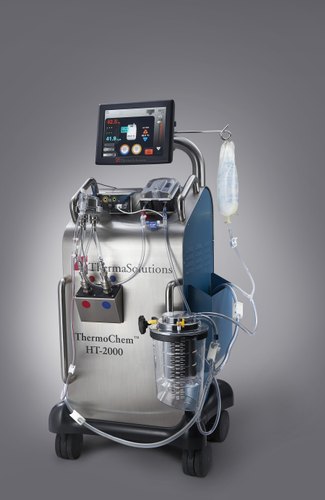What is HIPEC
Hipec or Hyperthermic Intraperitoneal Chemotherapy is a novel advancement in cancer surgery combined with chemotherapy.
Hipec procedure
Hipec procedure is done by experienced cancer surgeons. During the surgery, the surgeon will remove almost all the visible parts of cancer with the involved peritoneum ( the inner covering of the abdomen). This is called cytoreductive surgery. Once this is completed, microscopic tumors ( Cancer cells that can not be seen through the naked eye) are treated with chemotherapy. Chemotherapy agents are heated above the body temperature and circulate throughout the abdominal cavity ( inside your tummy) for 60 to 90 minutes.
The hipec machine controls the process, and it gradually warms up the chemotherapy agents to 105-109 F.
After one to two hours, the Chemotherapy solution is removed, and the peritoneal cavity is washed with saline.
This procedure increases the exposure of chemotherapy agents to the cancer cells and reduces these drugs’ systemic effects.
Indications for hipec
Not every patient with peritoneal cancer is suitable for HIPEC. As the procedure caries, high mortality and morbidity, patients are selected carefully.Commen Indications include
- Psedomyxome Peritonii
- Colorectal cancer with peritoneal metastasis
- Ovarian Cancer with peritoneal metastasis
- Gastric cancer with peritoneal Mets
- Peritoneal mesothelioma
- Apendiceal cancer with peritoneal deposits.
Patients not suitable for Hipec
- Metastasis to lungs, liver, and bone.
- Not fit for General Anaesthesia
- Allergic to chemotherapy agents
- More than one bowel obstruction
- A high peritoneal cancer index score
- Heart disease or serious medical conditions, making them unsuitable for anesthesia.
Aftercare of hipec
Complications for hipec
Complications of hypec may be related to surgery or chemotherapy. These may be short-term or long-term.
- Bleeding
- Wound breakdown
- Wound infections
- Sepsis
- Bowel injury
- Intestinal fistula
- Pancreatitis
- Renal failure
- Bone marrow suppression
- LONG TERM
- Depression
- Nausea
- Vomiting
- Fatigue
- Sleep disturbances
- Constipation o diarrhea.
What chemotherapy agents used for hipec
Different chemotherapy agents are used depending on the type of cancer. These include Cisplatin, Carboplatin, and pemetrexed.
Hipec mortality rate
The morbidity rate ranges from 12-52% in high-volume centers. The mortality rate ranges from 0.9% to 5.8%
Does hipec improve survival(does it increase Life)
HIPEC improves survival in carefully selected patients who were previously thought untreatable.
Principles of HIpec
Direct contact of cancer cells with chemotherapy agents
Cancer cells die when the temperature around 104f, whereas normal cells survive up to 111F.
Chemotherapy agents are not given to blood, so fewer side effects.
How long the procedure takes
It usually takes 6 to 18 hours. Surgical time varies depending on the extent of the cancer spread, locations of the cancer deposits, and experience of the surgeon.
HIPEC how effective
Mixed evidence
Mesothelioma – improves survival 2-6 years.
Ovarian cancer – Improves by one year.
Colon cancer – mixed evidence

